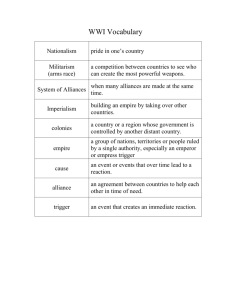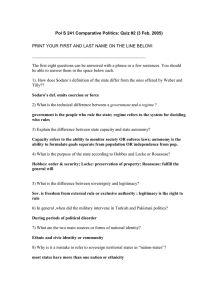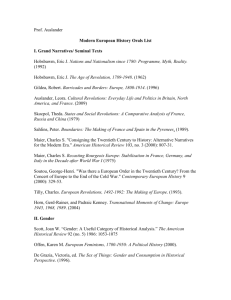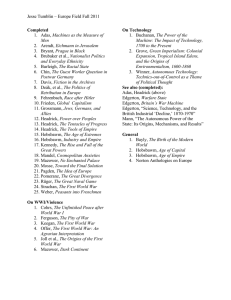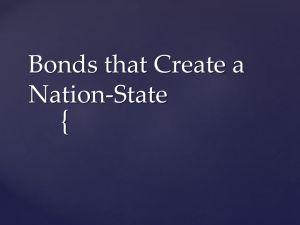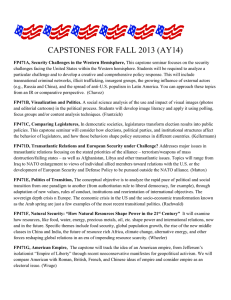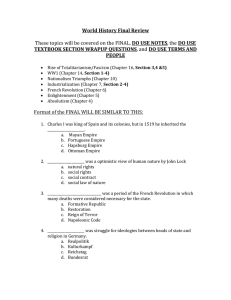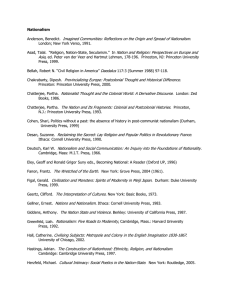Alexander Noonan International History (Cronin) Fall 2010: Final (62)
advertisement
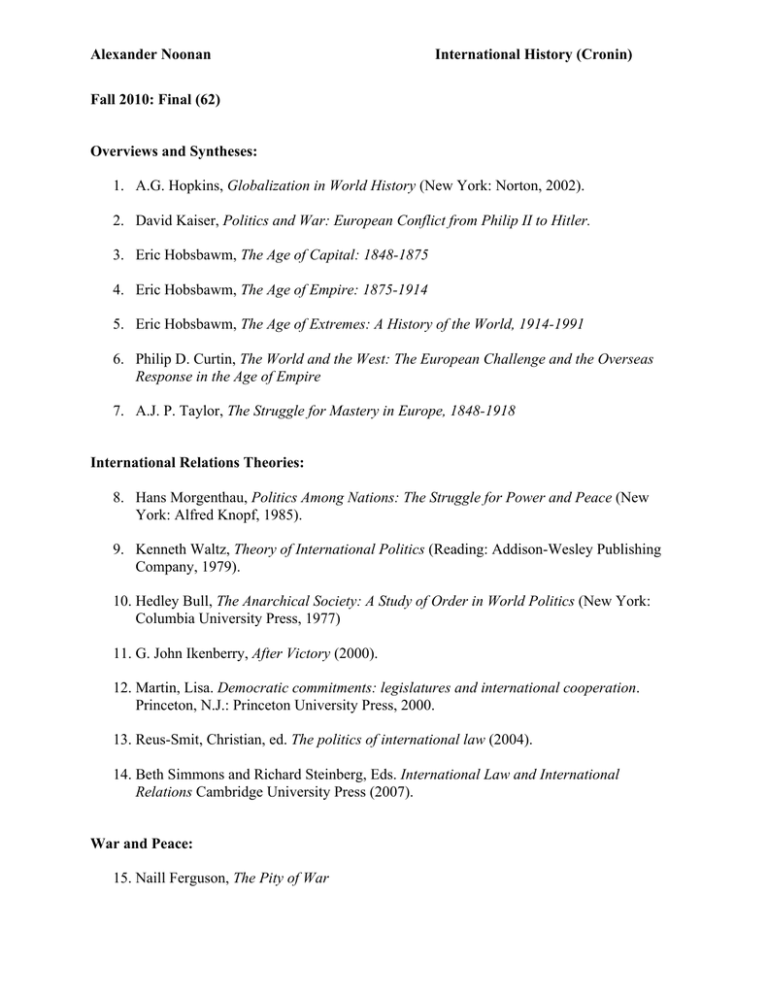
Alexander Noonan International History (Cronin) Fall 2010: Final (62) Overviews and Syntheses: 1. A.G. Hopkins, Globalization in World History (New York: Norton, 2002). 2. David Kaiser, Politics and War: European Conflict from Philip II to Hitler. 3. Eric Hobsbawm, The Age of Capital: 1848-1875 4. Eric Hobsbawm, The Age of Empire: 1875-1914 5. Eric Hobsbawm, The Age of Extremes: A History of the World, 1914-1991 6. Philip D. Curtin, The World and the West: The European Challenge and the Overseas Response in the Age of Empire 7. A.J. P. Taylor, The Struggle for Mastery in Europe, 1848-1918 International Relations Theories: 8. Hans Morgenthau, Politics Among Nations: The Struggle for Power and Peace (New York: Alfred Knopf, 1985). 9. Kenneth Waltz, Theory of International Politics (Reading: Addison-Wesley Publishing Company, 1979). 10. Hedley Bull, The Anarchical Society: A Study of Order in World Politics (New York: Columbia University Press, 1977) 11. G. John Ikenberry, After Victory (2000). 12. Martin, Lisa. Democratic commitments: legislatures and international cooperation. Princeton, N.J.: Princeton University Press, 2000. 13. Reus-Smit, Christian, ed. The politics of international law (2004). 14. Beth Simmons and Richard Steinberg, Eds. International Law and International Relations Cambridge University Press (2007). War and Peace: 15. Naill Ferguson, The Pity of War 16. Hew Strachan, The First World War 17. Margaret MacMillan, Paris 1919: Six Months that Changed the World 18. Arno Mayer, The Politics and Diplomacy of Peacemaking 19. E. H. Carr, The Twenty Years Crisis 20. Sally Marks The Illusion of Peace: International relations in Europe, 1918-1933 21. A.J. P. Taylor, The Origins of the Second World War 22. Akira Iriye, The Origins of the Second World War in Asia and the Pacific Development of Modern Capitalism: 23. Kenneth Pomeranz, The Great Divergence: China, Europe, and the Making of the Modern World Economy (2000). 24. Charles P. Kindleberger, The World in Depression, 1929-1939 25. Jeffrey Frieden, Global Capitalism: Its Fall and Rise in the Twentieth Century (2006). 26. Beth Simmons, Who adjusts? Domestic sources of foreign economic policy during the interwar years (1994). Domestic versus International: 27. Suri, Jeremi. Power and Protest: Global Revolution and the Rise of Detente. Cambridge: Harvard University Press, 2003. 28. Matthew Connelly, A Diplomatic Revolution: Algeria’s Fight for Independence and the Origins of the Post Cold War World (2002). 29. Robert Putnam, “Diplomacy and Domestic Politics: The Logic of Two-Level Games,” International Organization 42, no. 3 (Summer 1998): 427, 459-460. 30. Charles Tilly, Popular Contention in Great Britain, 1758-1834 (Cambridge: Harvard University Press, 1995). 31. Sidney Tarrow, Power in Movement: Social Movements and Contentious Politics (New York: Cambridge University Press, 1998). 32. Mary L. Dudziak, Cold War Civil Rights: Race and the Image of American Democracy (Princeton: Princeton University Press, 2000). 33. Carol Anderson, Eyes Off the Prize: The United Nations and the African American Struggle for Human Rights, 1944-1955 (Cambridge: Cambridge University Press, 2003) Empire and Hegemony: 34. Naill Ferguson, Empire: The Rise and Demise of the British World Order and the Lessons for Global Power 35. John Darwin, After Tamerlane: The Global History of Empire Since 1405 (2008). 36. David Cannadine, Ornamentalism: How the British Saw Their Empire 37. Peter Cain & Tony Hopkins, British Imperialism, 1688-2000 (2nd Edition) 38. Paul Kennedy, The Rise and Fall of the Great Powers: Economic Change and Military Conflict from 1500 to 2000. 39. Charles Maier, Among Empires: American Ascendency and its Predecessors (2007). 40. Peter Duus, The Abacus and the Sword: The Japanese Penetration of Korea, 1895-1910. 41. Efraim Karsh & Inari Karsh, Empires of the Sand: The Struggle for Mastery in the Middle East, 1789-1923. 42. Andrew Gordon, The Modern History of Japan: From Tokugawa Times to the Present 43. David Fromkin, A Peace to End All Peace: The Fall of the Ottoman Empire and the Creation of the Modern Middle East Nationalism: 44. Hagen Schulze, States, Nations and Nationalism: From the Middle Ages to the Present 45. Eric Hobsbawm, Nations and Nationalism Since 1780: Programme, Myth, Reality 46. Ernest Gellner, Nations and Nationalism 47. Benedict Anderson, Imagined Communities: Reflections on the Origins and Spread of Nationalism 48. Elie Kedourie, Nationalism Institutions and Networks: 49. Akira Iriye, Global Community: The Role of International Organizations in the Making of the Contemporary World (2002). 50. Mark Mazower, No Enchanted Place: The End of Empire and the Ideological Origins of the United Nations (2009). 51. Anne-Marie Slaughter, A New World Order (2005). 52. Margaret Keck and Kathryn Sikkink, Activists Beyond Borders: Advocacy Networks in International Politics (1998). 53. Mancur Olson, The Logic of Collective Action: Public Goods and the Theory of Groups (Cambridge: Harvard University Press, 1965). 54. Charles Tilly, “Social Movements and (All Sorts of) Other Political Interactions – Local, National, and International – Including Identities,” Theory and Society 27, no. 4 (August 1998). IDEAS, ORDERS AND MOMENTS: 55. David Armitage, The Declaration of Independence: A Global History (2007). 56. Walter Russell Mead, God and Gold: Britain, America and the Making of the Modern World (2007). 57. Barbara Tuchman, The Proud Tower: A Portrait of the World Before the War, 1880-1914 58. Erez Manela, The Wilsonian Moment: Self Determination and the International Origins of Anticolonial Nationalism (2007). 59. Odd Arne Westad, The Global Cold War: Third World Interventions and the Making of Our Times (2005). 60. Mary Ann Glendon, A World Made New: Eleanor Roosevelt and the Universal Declaration of Human Rights (2001). 61. Andrew Moravcsik, “The Origins of Human Rights Regimes: Democratic Delegation in Postwar Europe,” International Organization LIV (Spring 2000). 62. Beth Simmons, Mobilizing for Human Rights (2010).

